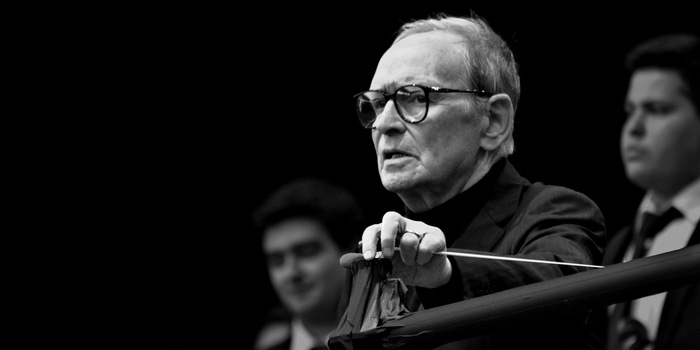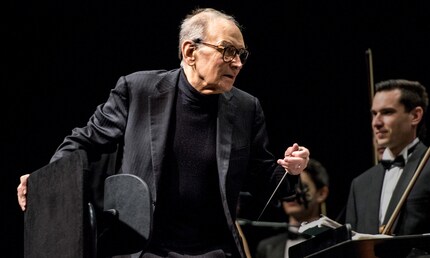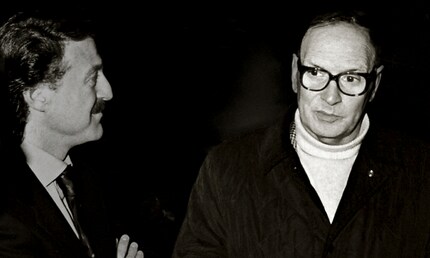
The Maestro takes his last bow: Ennio Morricone is dead
Ennio Morricone, the legendary film composer of influential scores including «The Good, the Bad and the Ugly» and «Once Upon a Time in the West» has fallen silent forever. An epitaph.
Ennio Morricone is dead.
The sad news was brought to the world by Giorgio Assumma, the family's lawyer. He reported that the legendary film composer passed away in a clinic in Rome early on Monday following complications caused by a fall he had had the week before.
Morricone was «fully lucid and with great dignity right until the end», his lawyer said. Morricone, whose most famous compositions include the movie scores for «Once Upon a Time in the West» and «The Good, the Bad and the Ugly» was 91 years old.
Ennio Morricone, the Maestro
His huge horn-rimmed glasses made him look somewhat nondescript. When in fact, the Maestro, as he was referred to, wrote the music for over 500 movies. The modest Italian was always grounded, despite many tempting offers from Hollywood. Not even a free villa was enough to lure the man away from his hometown Rome, which he never left.

Source: Wikimedia Commons / CC BY-SA 2.0
Morricone was born in Italy’s capital in 1928. His first love was football. Especially his favourite club, AS Roma. A passion that his father, the musician Mario Morricone, never fully appreciated. After Ennio wrote his first composition aged six – his father Mario had taught little Ennio to play several instruments at an early age – he was sent to the National Academy of Santa Cecilia. There, he studied trumpet under the tutelage of Umberto Semproni.
In 1940, at the age of 12, Morricone officially enrolled in the conservatory. There, he started a four-year harmony course and completed it in just six months. At the same time, Morricone studied the trumpet, composition and choral music. He would later dedicate all his concert pieces to his mentor, friend and role model Goffredo Petrassi.
In the 1940s, Morricone was chosen to be part of opera orchestra led by pianist and conductor Carlo Zecchi for a tour of Veneto. On the side, teenager Morricone was playing jazz and bossa nova – the Italians’ favourite music at the time – in bars and cafés in German-occupied Rome. Each time German soldiers entered the establishments he was playing in, Morricone was quick to change his repertoire.

Source: Wikimedia Commons / CC BY-SA 2.0
Morricone went on to refine his compositional craft, especially in the 1950s with the Italian broadcasting service. And yet, he never aspired to a career as a composer of classical music. Later on, he said there just wasn’t enough money to be earned with it.
However, he acquired a reputation as a master of light music early on. People described his music as fresh. Catchy without being banal. Morricone wrote countless hits. He covered every genre from party music to schmaltz; compositions without much wit but packed with humour and a good pinch of kitsch – making references to his favourite composers Beethoven and Bach like there was no tomorrow, sneaking in weird noises and treating the human voice as if it were an instrument.
It was a taste of his future film music that would take the world by storm.
Ennio Morricone and a fistful of dollars
In 1961, Ennio Morricone wrote his first movie score for Luciano Salce’s war satire «Il federale». At the same time, he joined the «Gruppo di Improvvisazione di Nuova Consonanza». «Il gruppo», or the group, as they also called themselves, was dedicated to all things «anti-musical». In other words, their goal was to create unusual tones that were not associated with the instrument that produced them rather than produce regular sounds.
It was this unusual style that earned Morricone a recommendation from a producer that would change his life. The life changer took place in 1964 when he met Sergio Leone. Leone surprise Morricone by telling him that they both attended the same school. They even sat together in the same row. Leone pulled out a photo to prove it.
The reason for their meeting: a western movie. Although the genre is popular, European versions were only rarely a success. Italian westerns of the time had a tendency to disappear into an abyss of insignificant movies. At best, that is. But Leone had a different plan. He didn’t care much for your standard stories in American westerns, such as settlers looking for land or their conflict with Native Americans. Instead, he intended to follow in the footsteps of Japanese director Akira Kurosawa. Replacing his stoic samurai warriors with cynical gunslingers and elegant sword fights with superhuman shooting techniques.
Morricone was up for it. The main score was going to be a piece that the Maestro had written nine years earlier. It would be rearranged and complemented with a whistle. In short: unusual.
«A Fistful of Dollars» was not only the first part of a trilogy and the start of the spaghetti western genre. It was also Morricone’s international breakthrough. Sergio Leone was so impressed by his composer that he wouldn’t make another movie without him. One of them being the final part of the dollar trilogy released in 1966: «The Good, the Bad and the Ugly». Its score is probably Ennio Morricone's most famous composition.
Critics have described Morricone's film music as a «rattlesnake in a drum». This is because the Maestro from Rome didn’t always do things the traditional way by opting for a big orchestra. Instead, he went for jew’s harps, electric guitars, harps and panpipes. And took things further still. Whistling, screams, cracking whips, coyote howls, owls hooting and pistol shots were an integral part of his compositions.
No other composer shaped the soundscape of western movies more than Ennio Morricone.
Ennio Morricone's long wait for an Oscar
It took far too long for the Academy, who ultimately decides who’s nominated for an Oscar and who wins it, to appreciate Morricone's music. By 2007, he had been nominated five times. The conservative representatives of the Academy weren’t warming to Morricone’s innovative sounds. This was particularly true during the 1960s and 1970s. In other words, the golden statue was always awarded to others.
It wasn’t until 2007 that Morricone was presented with an honorary Oscar for his lifetime achievement – a consolation prize. Nevertheless, the speech he gave was legendary. A true example of sincerity, gratitude and moving humility. The first thing the mastermind behind the scores for spaghetti westerns and other movies including «The Untouchables», «The Legend of 1900» or «Cinema Paradiso» did? He took a low bow before the thunderous applause of his audience.
The Maestro, who usually let the music do the talking struggled to find words. He was too touched. His voices failed him repeatedly. The actors and actresses present, masters of emotions by trade, fought to hold back their tears.
He started his speech by thanking everyone who had been crossing their fingers that he’d receive the award during his 60 years of creative work. He went on to mention the directors who gave him the creative freedom to write music that worked for the film, the director and the audience without having to give up on his own vision for the score. And finally, he thanked and dedicated the award to his wife Maria Travia, whom he always considered the highest censorship body. Only when she gave the green light, would he send the music to the producers.
In 2015, the Academy finally awarded him a prize for an actual composition – for Quentin Tarantino's «The Hateful Eight». His return to the western genre, coming full circle. Ironically, the then 87-year-old didn’t want to attend the award ceremony. After all, the Academy had let him down too many times before.
In true Morricone fashion, with a facial expression that turned from grumpy to warm, he dedicated the Oscar to his wife Maria. It couldn’t be an easy task to stick by his side, the Maestro admitted in his mischievous manner.
Now he’s fallen forever silent.
Ciao, Ennio Morricone. May you rest in peace.
Cover picture: Wikimedia Commons / CC BY-SA 2.0
I write about technology as if it were cinema, and about films as if they were real life. Between bits and blockbusters, I’m after stories that move people, not just generate clicks. And yes – sometimes I listen to film scores louder than I probably should.
From the latest iPhone to the return of 80s fashion. The editorial team will help you make sense of it all.
Show all